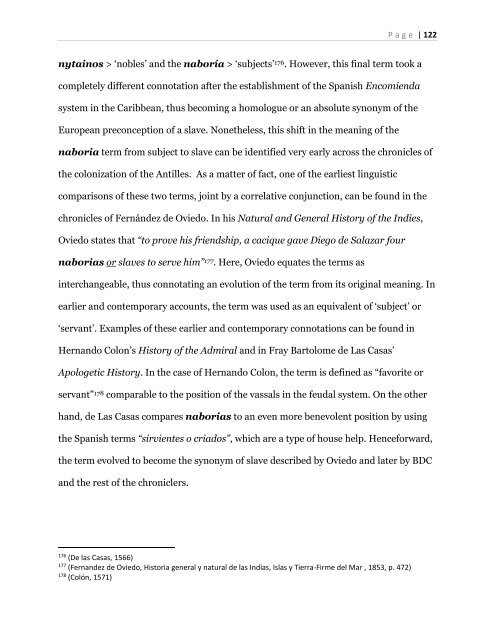Language of the Voiceless: Traces of Taino Language, Food, and Culture in the Americas From 1492 to the Present
by Leonardo Nin
by Leonardo Nin
You also want an ePaper? Increase the reach of your titles
YUMPU automatically turns print PDFs into web optimized ePapers that Google loves.
P a g e | 122<br />
nyta<strong>in</strong>os > ‘nobles’ <strong>and</strong> <strong>the</strong> naboría > ‘subjects’ 176 . However, this f<strong>in</strong>al term <strong>to</strong>ok a<br />
completely different connotation after <strong>the</strong> establishment <strong>of</strong> <strong>the</strong> Spanish Encomienda<br />
system <strong>in</strong> <strong>the</strong> Caribbean, thus becom<strong>in</strong>g a homologue or an absolute synonym <strong>of</strong> <strong>the</strong><br />
European preconception <strong>of</strong> a slave. None<strong>the</strong>less, this shift <strong>in</strong> <strong>the</strong> mean<strong>in</strong>g <strong>of</strong> <strong>the</strong><br />
naboria term from subject <strong>to</strong> slave can be identified very early across <strong>the</strong> chronicles <strong>of</strong><br />
<strong>the</strong> colonization <strong>of</strong> <strong>the</strong> Antilles. As a matter <strong>of</strong> fact, one <strong>of</strong> <strong>the</strong> earliest l<strong>in</strong>guistic<br />
comparisons <strong>of</strong> <strong>the</strong>se two terms, jo<strong>in</strong>t by a correlative conjunction, can be found <strong>in</strong> <strong>the</strong><br />
chronicles <strong>of</strong> Fernández de Oviedo. In his Natural <strong>and</strong> General His<strong>to</strong>ry <strong>of</strong> <strong>the</strong> Indies,<br />
Oviedo states that “<strong>to</strong> prove his friendship, a cacique gave Diego de Salazar four<br />
naborias or slaves <strong>to</strong> serve him” 177 . Here, Oviedo equates <strong>the</strong> terms as<br />
<strong>in</strong>terchangeable, thus connotat<strong>in</strong>g an evolution <strong>of</strong> <strong>the</strong> term from its orig<strong>in</strong>al mean<strong>in</strong>g. In<br />
earlier <strong>and</strong> contemporary accounts, <strong>the</strong> term was used as an equivalent <strong>of</strong> ‘subject’ or<br />
‘servant’. Examples <strong>of</strong> <strong>the</strong>se earlier <strong>and</strong> contemporary connotations can be found <strong>in</strong><br />
Hern<strong>and</strong>o Colon’s His<strong>to</strong>ry <strong>of</strong> <strong>the</strong> Admiral <strong>and</strong> <strong>in</strong> Fray Bar<strong>to</strong>lome de Las Casas’<br />
Apologetic His<strong>to</strong>ry. In <strong>the</strong> case <strong>of</strong> Hern<strong>and</strong>o Colon, <strong>the</strong> term is def<strong>in</strong>ed as “favorite or<br />
servant” 178 comparable <strong>to</strong> <strong>the</strong> position <strong>of</strong> <strong>the</strong> vassals <strong>in</strong> <strong>the</strong> feudal system. On <strong>the</strong> o<strong>the</strong>r<br />
h<strong>and</strong>, de Las Casas compares naborias <strong>to</strong> an even more benevolent position by us<strong>in</strong>g<br />
<strong>the</strong> Spanish terms “sirvientes o criados”, which are a type <strong>of</strong> house help. Henceforward,<br />
<strong>the</strong> term evolved <strong>to</strong> become <strong>the</strong> synonym <strong>of</strong> slave described by Oviedo <strong>and</strong> later by BDC<br />
<strong>and</strong> <strong>the</strong> rest <strong>of</strong> <strong>the</strong> chroniclers.<br />
176<br />
(De las Casas, 1566)<br />
177<br />
(Fern<strong>and</strong>ez de Oviedo, His<strong>to</strong>ria general y natural de las Indias, Islas y Tierra-Firme del Mar , 1853, p. 472)<br />
178<br />
(Colón, 1571)


















